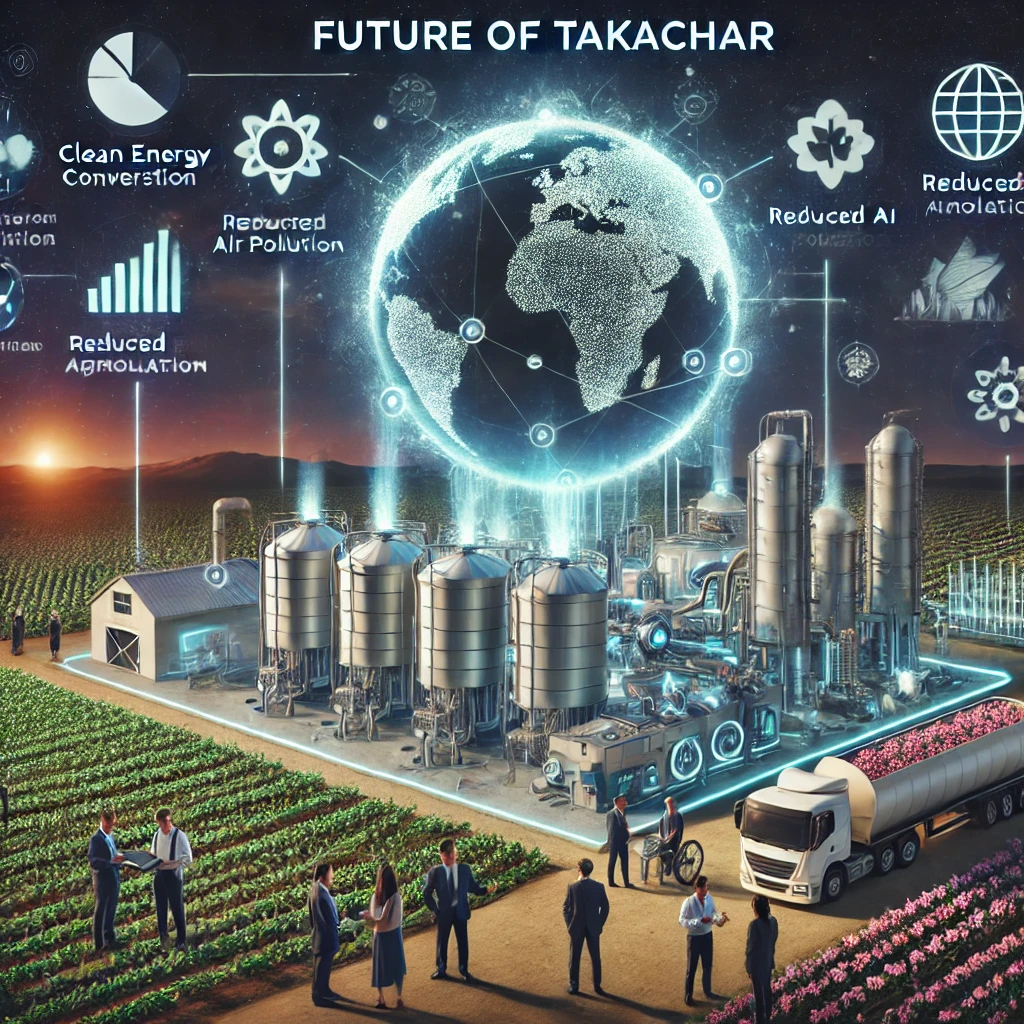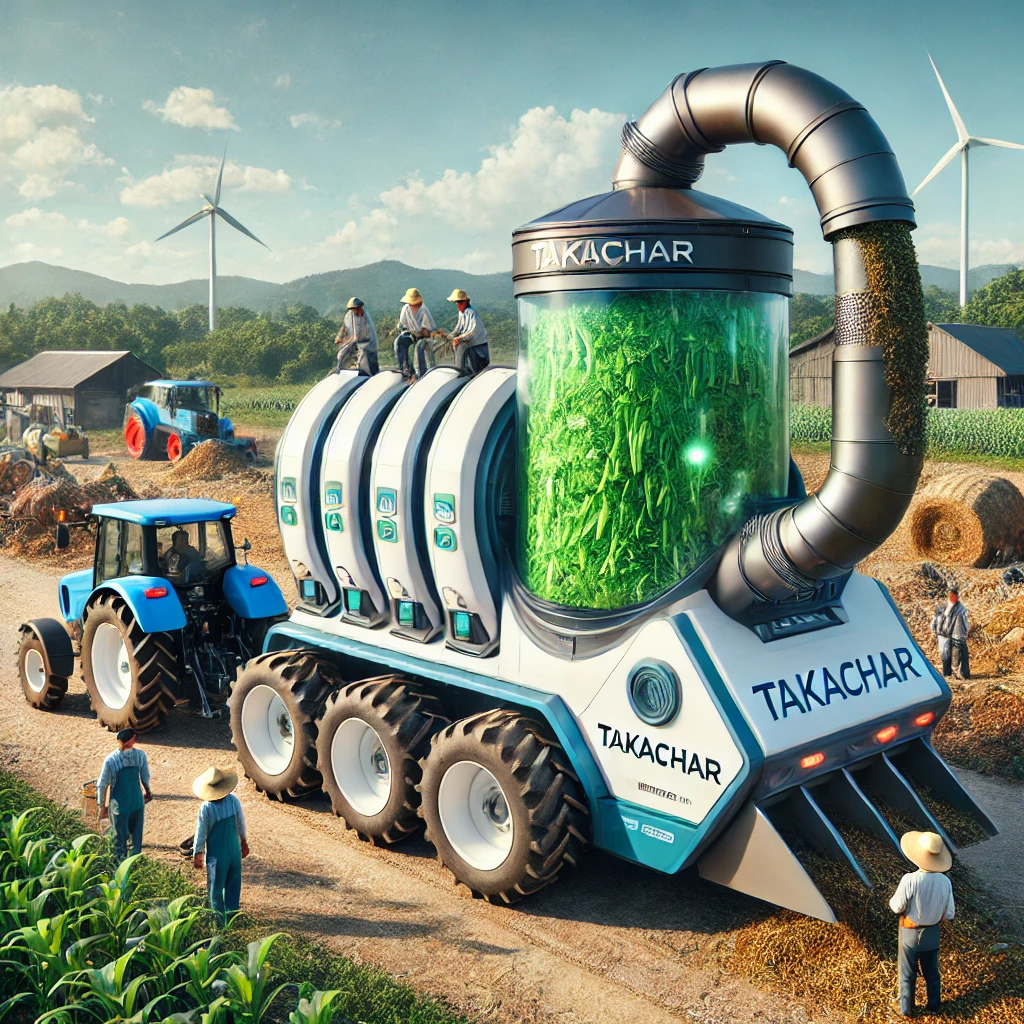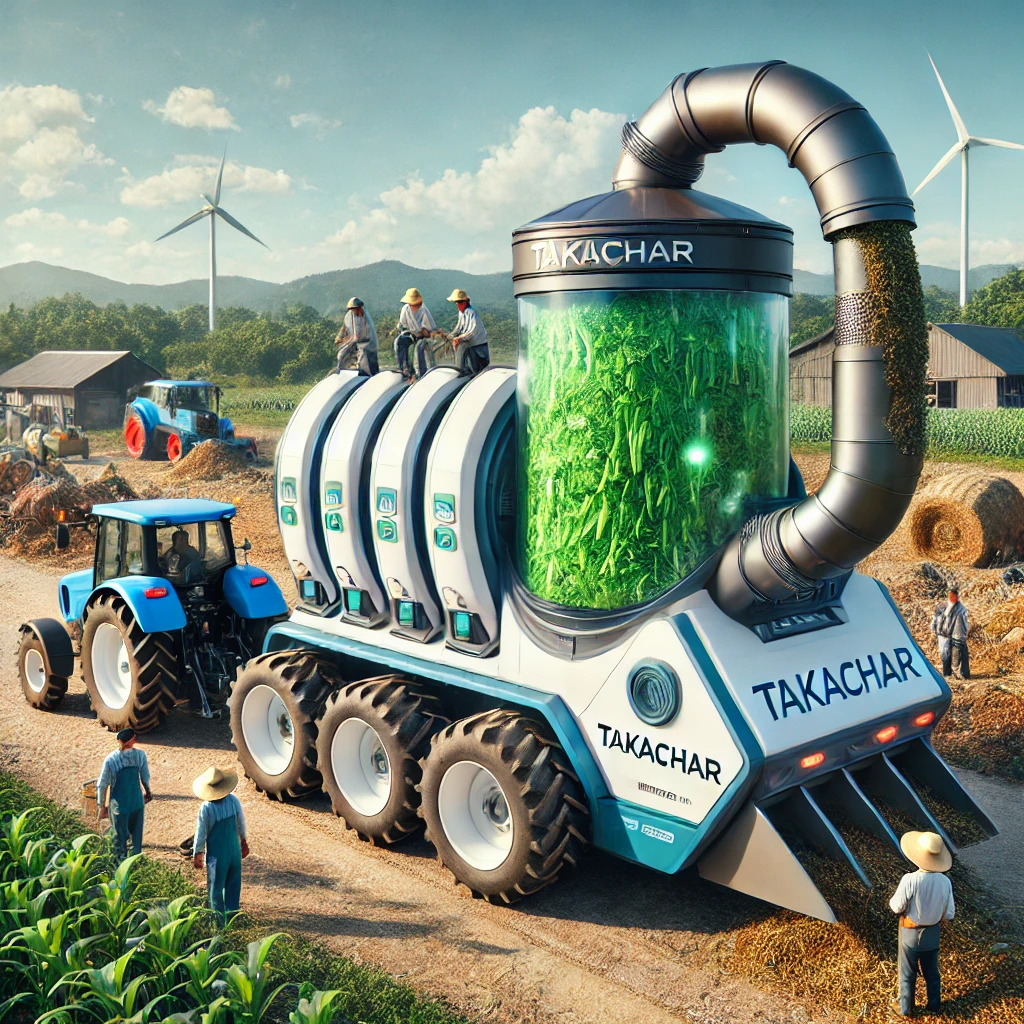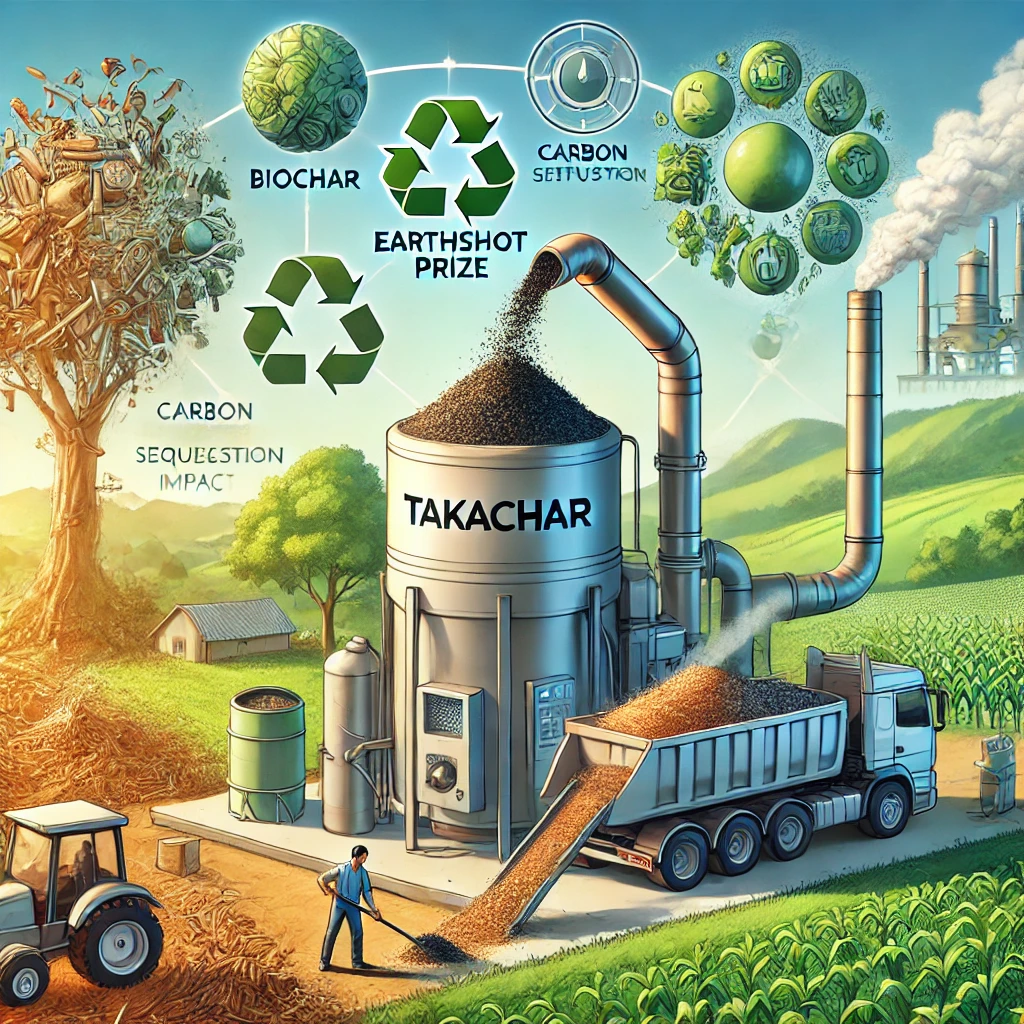Worldwide air pollution is a threatening global phenomenon and it affects the economic, environmental, and health conditions of the people greatly. One of the primary causes of this problem is the uncontrolled burning of agricultural waste, which is a very common habit across numerous countries. Due to a lack of modern technologies and resources, farmers have to burn remnants of their crops after harvesting them. This results in the emission of a huge amount of damaging toxins as well as greenhouse gas carbon monoxide which is a particulate matter. In India and many countries, pollution levels from the air caused by the extensive and commonplace practice of stubble burning have achieved drastic and devastating figures, especially following the harvest season.
Nevertheless, unique initiatives are being taken to combat such issues, one of which is – Takachar – which was founded to eliminate pollution caused by burning agricultural waste. They are a groundbreaking startup focused on addressing the issue of air pollution while utilizing Takachar’s invention. It’s a pioneering company that integrates advanced know-how and powerful rural issues. Hence, This startup is simultaneously decreasing the emission of smoke while giving farmers business opportunities and fostering sustainable development around the globe.
What is Takachar?
Takachar is a social enterprise started by Kevin Kung and Vidyut Mohan which aims to reduce air pollution and improve the livelihoods of those living in rural areas by transforming agricultural waste into valuable products. Differing biological materials such as crop residues, biofuels, fertilizers, and activated carbon can be produced through a low-cost and portable machine using the microwave torrefaction process. Burning agricultural waste is extremely harmful and would lead to the release of a multitude of toxic pollutants into the air, however, with this system in place, the pollutants are effectively captured.
The startup dreams of starting a new circular economy where aggravating agricultural waste could be transformed into a useful resource. By helping farmers make a profit off their agricultural residues, the startup is solving environmental as well as economic problems at once. Since large-scale farmers are never available in such neglected regions, small farmers from rural areas also have access to this technology because of its decentralized nature. This makes the solution extremely inclusive.
About the Founders
Kevin Kung
The bioengineering Ph.D. holder Kevin Kung serves as a co-founder of Takachar after earning his degree at the Massachusetts Institute of Technology (MIT). His years of research have focused on biomass conversion technology while his expertise consists of developing sustainable methods to lower waste production and tackle air pollution. Kung dedicates his professional life to environmental protection through technological solutions because he firmly supports technology’s ability to create beneficial changes. Through his efforts, Kung developed several projects regarding renewable energy and carbon sequestration before establishing Takachar to find sustainable solutions for climate change.
During his time observing rural communities directly,y Kung developed the initial plan that became Takachar. The open agricultural waste burning activities presented two problems simultaneously as both a destructive environmental hazard and potential economic value that was discarded. His discovery motivated him to build an affordable scale-up system that the farmers could directly install on their land.
Vidyut Mohan
Vidyut Mohan works alongside Takachar’s co-founder status as an Indian social entrepreneur who focuses on clean energy initiatives alongside sustainable development efforts. He received recognition through his work by obtaining a spot on Forbes’ 30 Under 30 Asia due to his environmental innovation contributions. Mohan dedicates his work to developing independent technologies that enable rural farmers to progress and improve their agricultural conditions. this leadership Takachar has transformed into a worldwide celebrated initiative that now operates in various countries while receiving multiple awards.
Mohan initiated his Takachar work because he comprehended how Indian farmers dealt with stubble burning which significantly contributes to airborne contaminations. He noticed the possibility of solving this problem by inventing a technology platform that transformed agricultural waste into marketable goods to substitute stubble fires. The core driver of Takachar’s achievements comes from his dedication to sustainability together with its impact on society.
How Takachar Works
The core technology of Takachar brings tractor-attached biomass conversion units directly to farming environments for onsite use. Torrefaction is a thermal decomposition process that happens through low-oxygen conditions in this system. Agricultural waste materials including crop residues, rice husks together with coconut shells become solid biofuels, fertilizers along activated carbon when heated to torrefaction temperatures.
Thorough decentralization stands as the primary benefit of the technology developed by Takachar. The Takachar system differs from typical massive centralized expensive biomass processing units by making itself available at affordable rates to small farmers throughout India. The solution eliminates the practice of farming waste transportation to processing centers because of its affordability and functionality needs.
The circular manufacturing capability of this startup allows farmers together with the environment to benefit through waste conversion into commercial products. The sustainable alternative for farmers to convert their crop residues involves selling them to produce biofuels and fertilizers thus creating more economic value. During the process, the emissions decrease dramatically which provides benefits to both air quality and planetary health.
Interesting Facts About Takachar
The information shows that Takachar’s technology successfully reduces smoke emissions produced by open biomass burning to a level of 98%. This indicates its high effectiveness in fighting air pollution.
Takachar secured one of the Earthshot Prize 2021 awards as a winner which represents a distinguished international recognition for environmental solutions created by Prince William.
The Takachar technology has achieved field tests in both India and Kenya which proves its ability to fight air pollution and help enhance rural economic development across different regions.
Research and development at the startup company receives backing from important institutions including MIT as well as the Shell Energy Challenge and the Tata Center for Technology and Design.
The Takachar model completely utilizes each kilogram of biomass waste through its operations to establish both carbon emission reduction and circular economy performance.
Air pollution and sustainability receive direct positive effects as a result of Takachar operations.
The innovative approach of Takachar brings forth multiple environmental advantages combined with social value:
Through its elimination of open burning Takachar system successfully decreases atmospheric releases of harmful emissions composed of carbon monoxide and particulate matter and greenhouse gases. Because stubble burning is widespread in certain areas Takachar reduces harmful pollutants in the air directly.
The manufactured biochar along with activated carbon from Takachar’s technology possesses dual applications for industrial purposes and biologically enriching the soil. The products created by this process capture carbon that provides them value during the climate change battle.
Through its selling mechanism, Takachar enables farmers to earn increased income by selling their crop residues instead of traditional burning methods. The improved economic situation of farmers comes with the added benefit of encouraging sustainable practices using their resources.
The portable Takachar technology offers affordability and scalability to small-scale farmers which permits its application across rural communities throughout the world.
Employment growth occurs through local biomass processing through Takachar operations which leads to both rural economic development and reduces rural poverty levels.
Turnover, Investors, and Stock Market Status
Turnover
The company Takachar recorded significant expansion since its establishment through its multiple million-dollar revenue streams per year. Revenue at the company originates mainly from selling their biomass conversion systems together with valuable products which include biochar and activated carbon. Viability in the growing sustainable waste management market gives Takachar an advantage to boost its operational footprint and financial results.
Investors
The company has obtained substantial investment funding from sustainability-minded organizations and individuals who wish to advance clean energy initiatives. Investments from several key organizations along with social groups actively support the operations of the startup.
MIT Tata Center: Provides research and development support for innovative clean technology projects.
Shell Energy Challenge has identified Takachar’s capability to transform sustainable energy alternatives.
Social Alpha actively invests funding into startups that approach vital social and environmental matters.
The Lemelson Foundation: Supports innovations with a strong focus on positive societal impact.
The Earthshot Prize Fund acknowledged this startup by giving it an award because of its exceptional work in fighting air pollution and climate change.
Stock Market Status
The private company Takachar exists under the ownership of private investors who have not taken it to the public stock market. Taking notice of its swift expansion and rising international investment in sustainable technology it is anticipated that Takachar will launch an initial public offering (IPO) shortly. This strategic implementation would enable the startup to obtain the critical funding that it needs to increase its infrastructure while enlarging its worldwide impact.
Awards and Recognition
Because of its unique approach to solving modern dire environmental issues, major international media outlets have featured Takachar. Its revolutionary work has enabled the startup to gain extensive widespread recognition and receive multiple honors. These awards and honors helped to enhance Takachar’s exposure leading to greater investments and support. Takachar received the Earthshot Prize in the 2021. This prize is ranked as the most prestigious environmental award which was given to the startup due to its groundbreaking work.
The Future of Takachar
To accomplish greater technological success, in future steps, Takachar plans to join forces with public organizations and major companies. Through its torrefaction technology, Takachar is developing additional use cases that will go beyond biomass energy, along with controlling forestry wastes, and urban organic waste. Additionally, Takachar plans to serve further regions of the world by attending to more farmers which would help in enabling growth across regions.

To achieve cleaner air combined with healthier communities while reinforcing sustainable agriculture, The startup continues the refinement process of its solutions. The solution it developed helps to enable a significant decrease in pollution, while simultaneously establishing conditions for healthy development.
Final Thoughts
Takachar exemplifies how technology and entrepreneurship can be combined to appropriately solve some of the world’s including air pollution, agricultural waste management, and deforestation. By taking innovative approaches to tackle complex problems, the startup is solving air pollution problems while also generating economic growth in rural regions. Moreover, social impact and profit generation can coexist simultaneously, which means the startup serves as a powerful example of change.
Takachar reminds and provides initiatives for the rest of us to be hopeful and proactive. Like other industry players, we should also be supporting and scaling such solutions to further mitigate the impact of pollution and other climate change challenges.
Would you like to learn more about Takachar’s technology or explore ways to support its mission? Let us know in the comments!














